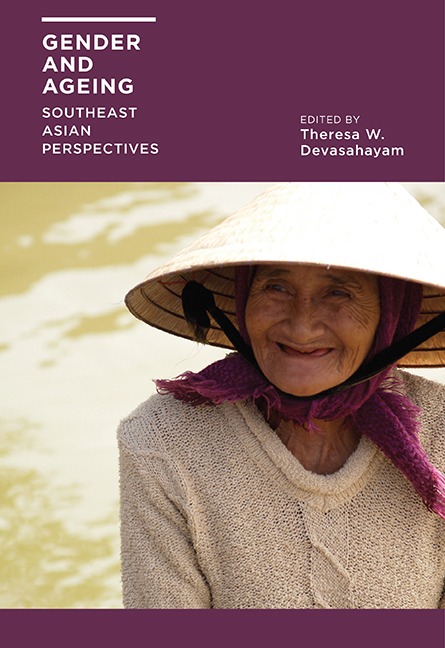Book contents
- Frontmatter
- Contents
- List of Tables and Figures
- Acknowledgments
- Contributors
- 1 Growing Old in Southeast Asia: What Do We Know about Gender?
- 2 Gender and Ageing in Thailand: A Situation Analysis of Older Women and Men
- 3 Gender and Well-being of Older Persons in Cambodia
- 4 Preparations for Old Age and Social Participation of Present and Future Older Persons in Thailand: Gender Difference
- 5 Gender and Health Status among Older Adults in Vietnam
- 6 Ageing and Gender Preferences in Rural Indonesia
- 7 Exploring the Experiences of Older Men and Women in Caregiving and Care-receiving in Sarawak, Malaysia
- 8 An “Active Ageing” Approach to Living Alone: Older Men and Women Living in Rental Flats in Singapore
- 9 Ethnic Patterns and Styles of Active Ageing among Widows and Widowers in Singapore
- 10 Employment Patterns of Older Women in Indonesia
- 11 Gender Differentials in Work and Income among Older Malaysians
- 12 Gender and Economic Well-being among Older Filipinos
- 13 Work, Retirement and the Gender Divide in the Philippines
- Index
5 - Gender and Health Status among Older Adults in Vietnam
Published online by Cambridge University Press: 21 October 2015
- Frontmatter
- Contents
- List of Tables and Figures
- Acknowledgments
- Contributors
- 1 Growing Old in Southeast Asia: What Do We Know about Gender?
- 2 Gender and Ageing in Thailand: A Situation Analysis of Older Women and Men
- 3 Gender and Well-being of Older Persons in Cambodia
- 4 Preparations for Old Age and Social Participation of Present and Future Older Persons in Thailand: Gender Difference
- 5 Gender and Health Status among Older Adults in Vietnam
- 6 Ageing and Gender Preferences in Rural Indonesia
- 7 Exploring the Experiences of Older Men and Women in Caregiving and Care-receiving in Sarawak, Malaysia
- 8 An “Active Ageing” Approach to Living Alone: Older Men and Women Living in Rental Flats in Singapore
- 9 Ethnic Patterns and Styles of Active Ageing among Widows and Widowers in Singapore
- 10 Employment Patterns of Older Women in Indonesia
- 11 Gender Differentials in Work and Income among Older Malaysians
- 12 Gender and Economic Well-being among Older Filipinos
- 13 Work, Retirement and the Gender Divide in the Philippines
- Index
Summary
INTRODUCTION
Over the last decade, the growing size of Vietnam's older population has prompted the government to pay more attention to the well-being of this group (Bui et al. 2000; Nguyen 1998; VCPFC 2002). The proportion of Vietnamese adults age 60 and above is projected to rise substantially from 8 per cent in 2000 to 13 per cent in 2025 and over 25 per cent by the mid twenty-first century (United Nations 2007a). Female old-age vulnerability has been placed in the forefront of government-funded social programmes to improve the living standards of the old (HelpAge 2007; Mitchell and Khuat 2000; United Nations 2002, 2007b). Influenced by the dominant policy discourse on gender and ageing, Vietnamese policymakers are concerned that older women would be more susceptible than men to various forms of hardship because they tend to experience socioeconomic disadvantage in early life and to be widowed in older years (Giang and Pfau 2007a; Ofstedal et al. 2003).
Recently the disproportionate policy focus on older women's vulnerability has been increasingly criticized for its lack of consistent evidence and for its dismissal of men's potential disadvantages (Knodel and Ofstedal 2003). For example, while women might be inferior to men in the labour market, they are not necessarily more vulnerable in later life since female elders tend to be more protected socially by family and kin network support. These criticisms also extend to the prevailing perspective on gender and health equity which posits that women are more likely than men to have poor health at older ages. The issue is particularly relevant to Vietnam's recent efforts to address the healthcare needs of its older population. While healthcare provision for the elderly, especially for female elders who are less likely to receive pension and health insurance, has been discussed widely in the public sphere, little is known about the extent to which health status in older years varies by gender and what mechanisms lie behind male-female differences (Thanh Nien News 2009; Vietnam News 2008).
- Type
- Chapter
- Information
- Gender and AgeingSoutheast Asian Perspectives, pp. 122 - 149Publisher: ISEAS–Yusof Ishak InstitutePrint publication year: 2014

